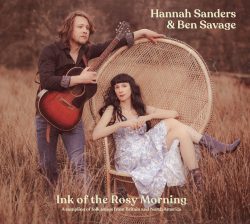An artfully executed, stripped back but still enchanting collection of traditional folk songs.
 It would be fair to say that 2020 changed most of us in a variety of ways, some less expected than others. For duo Hannah Sanders and Ben Savage, this change led to them completely scrapping what was a virtually finished third album (tracks laid down, guest artists and all) and starting again. This fresh beginning saw them shunning a standard studio environment, instead recording the album of traditional folk songs in a former schoolhouse by the sea in Hastings. They set up and played there with nothing but a few mics scattered around, and crucially, no demos, no plan, and no thought to even release what they recorded. What they ended up with was bare bones and simplistic, but still utterly captivating. “I’ll love you ‘till the sea runs dry / ‘Till the rocks all melt with the sun / I’ll love you ‘till the day that I die / Though you’ll never be my own,” Sanders and Savage sing sweetly on the opener ‘A Winter’s Night’, their gentle harmonies and relaxed strumming setting the tone of things to come.
It would be fair to say that 2020 changed most of us in a variety of ways, some less expected than others. For duo Hannah Sanders and Ben Savage, this change led to them completely scrapping what was a virtually finished third album (tracks laid down, guest artists and all) and starting again. This fresh beginning saw them shunning a standard studio environment, instead recording the album of traditional folk songs in a former schoolhouse by the sea in Hastings. They set up and played there with nothing but a few mics scattered around, and crucially, no demos, no plan, and no thought to even release what they recorded. What they ended up with was bare bones and simplistic, but still utterly captivating. “I’ll love you ‘till the sea runs dry / ‘Till the rocks all melt with the sun / I’ll love you ‘till the day that I die / Though you’ll never be my own,” Sanders and Savage sing sweetly on the opener ‘A Winter’s Night’, their gentle harmonies and relaxed strumming setting the tone of things to come.
‘Polly O Polly’ is a song that Sanders was introduced to years ago by roots music legend David Holt, but only when she teamed up with Savage did she find the perfect way to record the dark story with a light melody. “Willy O Willy I’m afraid of your ways / I’m afraid you will lead my poor body astray,” worries the heroine of the song, her paramour and soon to be murderer finally admitting: “Polly O Polly you’re thinking quite right / I dug on your grave the best part of last night.”
‘When I First Came to Caledonia’ sees Savage take mostly solo vocal duties, the sometimes roughness of his tone contrasting well with the occasional and serene harmonies from Sanders. ‘Lovely Joan’ – a song about a woman outsmarting a man who sees her as only an object to be wooed – is, to quote Sanders, “a Norfolk song for a Norfolk girl” and “[one] of the original English feminist anthems”, and this version of the song was born out of a long jam session between Savage and Sanders, something that’s felt in the enjoyably languid pace that still manages to remain musically tight.
‘False True Love’ is rich with sunny but sad harmonies that help to enrich the tale of heartbreak. ”Come in, come in, you old true love / And chat for a while with me / For it’s been three quarters of a long year or more / Since I spoke one word to thee,” encourages the character in the first verse, only for the one he’s speaking to to refuse in the second: “I shall not come in, I shall not sit down / For I ain’t got a moment’s time / For you’re engaged to another true love / And your heart is no longer mine.”
Of the versions of ‘Sweet Nightingale’ the duo have been known to play, Savage has said that they tend to sit between “extremes of rambunctious or dainty” and that they aimed to provide a balance of those two here, and it’s a sweet spot they hit, the recording feeling both soft but also having a powerful presence. ‘Lark in the Morning’ has an arrangement that Sanders says was “inspired by the bright and swift flight of the skylarks in the fields around where we live in Cambridgeshire”, something that’s really conveyed in the brightness of the tune as it glides along. “I was born on Paradise Row / Agar Town 1844 / I fell in love with Eliza Brown / Her father ran the bar next door,” Savage speaks more than sings on the opening of ‘River Don’t Run’, the harmonies Sanders goes on to add generating a warmth of feeling.
“Historically, we usually go hard down the rabbit hole to make albums, so this was very different. It was all so relaxed,” Savage himself reflected of the stripped back manner in which he and Sanders produced ‘Ink of the Rosy Morning’. Indeed, there aren’t many positives from the pandemic, but one thing it taught us was the importance of reconnecting to the simple beauty around us; that not everything requires bells and whistles to impress. So, let’s hope that Sanders and Savage take this newly relaxed method of recording that led to such lovely results with them in the years to come – a little light from the dark days that showed us more about ourselves and the beauty in the uncomplicated.


